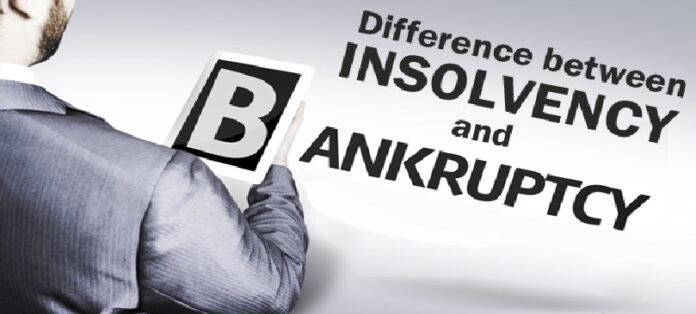Are you one paycheck away from poverty?
Most people are, and they don’t even know it. In fact, according to a recent study, 78% of Americans are living paycheck to paycheck. That means that if something unexpected happened, like a job loss or a major illness, they would be unable to cover their expenses. And if you’re one of those people, then you need to know the insolvency vs. bankruptcy differences.
This blog post will explain the differences between insolvency and bankruptcy, and it will help you decide which option is right for you.
What Is Insolvency?
Insolvency is a legal term that refers to the state of a business or individual who is unable to pay their debts as they come due. When a company becomes insolvent, it means that its liabilities exceed its assets.
This can be caused by a variety of factors, such as:
- Poor management
- Economic recession
- Competition from larger businesses
- Lack of debt recovery plan in place
- Poor financial management
- Too much debt
- Relying too much on one client
- Failure to separate personal and business finances
If a company is insolvent, it does not mean that it has gone bankrupt. In fact, many insolvent companies continue to operate while they work out a plan to repay their creditors. However, if the insolvent company cannot pay its debts within a reasonable timeframe, it may have to file for bankruptcy protection.
Insolvency Tips
Running and managing a successful business can be challenging. However, when companies fail due to hard times and creditors are knocking on your door, it can be tough for any leader.
If you’re running a company that creditors consistently pursue and you’re headed to insolvency, you’re legally obligated to place the needs of your creditors ahead of your company’s. Below are a few tips to follow during such times:
- Get help from a professional insolvency advisor
- Be honest and open with the creditors
- Review your finances regularly and make adjustments
- Do not take any more business loans
- Separate your personal and business finances
- Don’t put in your personal finances
- Try to negotiate with your creditors to get a lower interest rate or payment schedule
- Consider filing for insolvency if you cannot pay your debts within a reasonable timeframe
Taking the above actions can help you mitigate the impact of insolvency on your business. It also helps you avoid misfeasance claims. If you find yourself in a financial hole, contact us at https://www.ndandp.co.uk/insolvency-claims/misfeasance-claims/ and we will help you through the process.
What Is Bankruptcy?
Bankruptcy is a legal process that provides relief to individuals or businesses who cannot repay their debts. When a company files for bankruptcy, it is essentially asking the court to help them reorganize their finances to pay back their creditors over time.
In most cases, bankruptcy will discharge some or all of your debt. However, there are also several drawbacks to filing for bankruptcy. These drawbacks include:
- You may lose your property
- You may not be able to get credit for several years
- Your credit score will drop significantly
- You may have to give up certain assets
- The bankruptcy process can be lengthy and complex
Filling for bankruptcy means that you are insolvent. However, insolvency does not always mean that you will have to file for bankruptcy.
What Happens When You File for Bankruptcy?
An insolvency trustee is appointed to your case when you file for bankruptcy. This trustee will work with you to develop a repayment plan for your debts.
You will be required to make regular payments to the trustee, who will then use those funds to pay off your creditors. In most cases, you will be required to sell some of your assets to come up with the money needed to repay your debts.
Once you have completed your repayment plan, any remaining debt will be discharged, and you will be free from your financial obligations.
Bankruptcy can be a difficult and stressful process. However, it is important to remember that insolvency does not always mean that you will have to file for bankruptcy.
If you cannot repay your debts, speak to a professional insolvency advisor to discuss your options. They can help you develop a debt recovery plan and negotiate with your creditors. They will also help you review your finances regularly and advise you on the necessary adjustments to make to ensure you recover.
Insolvency vs. Bankruptcy: Differences
Now that you know the basics of insolvency and bankruptcy; let’s take a closer look at the differences between them. So, what is the difference between insolvency and bankruptcy?
Insolvency is the state of being unable to pay your debts, while bankruptcy is a legal process that provides relief to individuals or businesses unable to repay their debts.
In most cases, insolvency will lead to bankruptcy, but there are also several ways to avoid bankruptcy. Bankruptcy is a more severe option that can have long-term consequences, such as affecting your credit score for several years. It can also cause you to lose property or assets.
The insolvency process is usually shorter and less complex than the bankruptcy one. If you cannot repay your debts, speak to an insolvency advisor about your options.
Filing for bankruptcy may be the best solution for businesses that cannot pay their debts, while insolvency is typically used by individuals. However, it is important to remember that insolvency does not always mean bankruptcy.
Now You Know the Difference Between Insolvency and Bankruptcy
Now that you know the insolvency vs. bankruptcy differences, ensure you evaluate each option carefully before choosing the best one for your business. Each option has its own set of benefits and drawbacks. Hence, it is important to consider your financial situation and weigh both options carefully.
Did you find this article informative? Check out other posts on our site for more finance-related tips.








